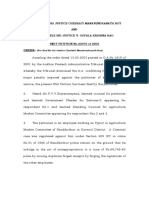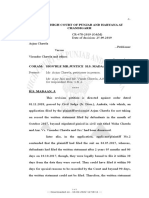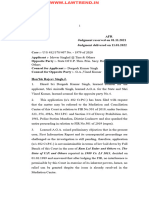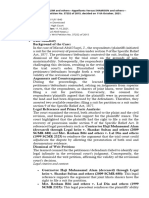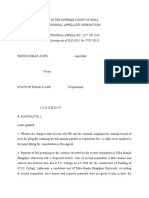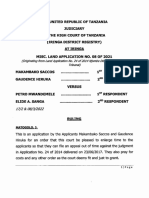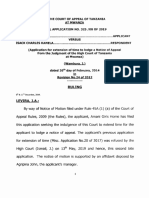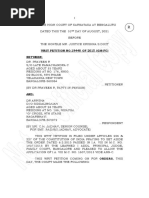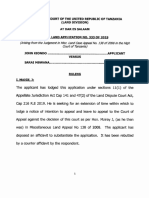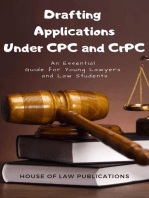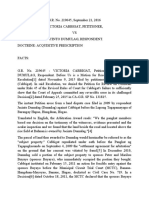0 ratings0% found this document useful (0 votes)
63 viewsGurpal Singh Ahluwalia, J.: Equiv Alent Citation: 2019 (3) MPLJ62
Gurpal Singh Ahluwalia, J.: Equiv Alent Citation: 2019 (3) MPLJ62
Uploaded by
TSA LEGAL1) The petitioner challenged the initiation of a departmental inquiry and charge sheets issued against him related to alleged unfair means used during an exam for police recruitment.
2) He argued that the departmental inquiry should be stayed as there is an overlapping criminal case regarding the same issues, and disclosure of his defense in the inquiry could prejudice the criminal trial.
3) The court discussed past judgments regarding whether a departmental inquiry can be stayed while a criminal case is pending, and said each case must be considered based on its own facts and circumstances. It did not make a final ruling, and further hearings were needed.
Copyright:
© All Rights Reserved
Available Formats
Download as PDF, TXT or read online from Scribd
Gurpal Singh Ahluwalia, J.: Equiv Alent Citation: 2019 (3) MPLJ62
Gurpal Singh Ahluwalia, J.: Equiv Alent Citation: 2019 (3) MPLJ62
Uploaded by
TSA LEGAL0 ratings0% found this document useful (0 votes)
63 views13 pages1) The petitioner challenged the initiation of a departmental inquiry and charge sheets issued against him related to alleged unfair means used during an exam for police recruitment.
2) He argued that the departmental inquiry should be stayed as there is an overlapping criminal case regarding the same issues, and disclosure of his defense in the inquiry could prejudice the criminal trial.
3) The court discussed past judgments regarding whether a departmental inquiry can be stayed while a criminal case is pending, and said each case must be considered based on its own facts and circumstances. It did not make a final ruling, and further hearings were needed.
Original Description:
JUDGEMENT
Original Title
Balbeer_Singh_Gurjar_vs_State_of_MP_and_Ors_210120MP2019060819164655394COM666255
Copyright
© © All Rights Reserved
Available Formats
PDF, TXT or read online from Scribd
Share this document
Did you find this document useful?
Is this content inappropriate?
1) The petitioner challenged the initiation of a departmental inquiry and charge sheets issued against him related to alleged unfair means used during an exam for police recruitment.
2) He argued that the departmental inquiry should be stayed as there is an overlapping criminal case regarding the same issues, and disclosure of his defense in the inquiry could prejudice the criminal trial.
3) The court discussed past judgments regarding whether a departmental inquiry can be stayed while a criminal case is pending, and said each case must be considered based on its own facts and circumstances. It did not make a final ruling, and further hearings were needed.
Copyright:
© All Rights Reserved
Available Formats
Download as PDF, TXT or read online from Scribd
Download as pdf or txt
0 ratings0% found this document useful (0 votes)
63 views13 pagesGurpal Singh Ahluwalia, J.: Equiv Alent Citation: 2019 (3) MPLJ62
Gurpal Singh Ahluwalia, J.: Equiv Alent Citation: 2019 (3) MPLJ62
Uploaded by
TSA LEGAL1) The petitioner challenged the initiation of a departmental inquiry and charge sheets issued against him related to alleged unfair means used during an exam for police recruitment.
2) He argued that the departmental inquiry should be stayed as there is an overlapping criminal case regarding the same issues, and disclosure of his defense in the inquiry could prejudice the criminal trial.
3) The court discussed past judgments regarding whether a departmental inquiry can be stayed while a criminal case is pending, and said each case must be considered based on its own facts and circumstances. It did not make a final ruling, and further hearings were needed.
Copyright:
© All Rights Reserved
Available Formats
Download as PDF, TXT or read online from Scribd
Download as pdf or txt
You are on page 1of 13
MANU/MP/0430/2019
Equivalent Citation: 2019(3)MPLJ62
IN THE HIGH COURT OF MADHYA PRADESH (GWALIOR BENCH)
W.P. Nos. 910 and 19653 of 2017
Decided On: 21.01.2019
Appellants: Balbeer Singh Gurjar
Vs.
Respondent: State of M.P. and Ors.
Hon'ble Judges/Coram:
Gurpal Singh Ahluwalia, J.
Counsels:
For Appellant/Petitioner/Plaintiff: Anil Mishra
For Respondents/Defendant: Vivek Jain, Government Advocate
JUDGMENT
Gurpal Singh Ahluwalia, J.
1. Shri Anil Mishra, counsel for the petitioner in both writ petitions.
Shri Vivek Jain, Government Advocate for the State.
2 . This common order shall also dispose of WP 19653/2017 filed by Balbeer Singh
Gurjar.
3. The controversy involved in both the petitions lies in a narrow compass.
4. According to the petitioner, he was appointed on the post of Platoon Commander
in Special Armed Force and he was serving with the said Department. Thereafter, the
petitioner applied for the post of Sub-Inspector, District Police in response to the
advertisement issued by Professional Examination Board in the year 2016. The
petitioner appeared in online test, which was held on 6-9-2016. It is the allegation of
the prosecution that during search, the petitioner was found to be using unfair means
and prohibited gadgets like one mobile I-phone, one smart watch, blue tooth and one
remote and he also refused to give his search and tried to run away. Accordingly, the
police registered the criminal case against the petitioner in Crime No. 320/2016, at
Police Station Jhansi Road, Gwalior for offence under section 3/4 of the Examination
Act and under section 66 of the Information Technology Act.
5 . It is the contention of the petitioner that the police, after completing the
investigation, has filed the charge-sheet. In Writ Petition No. 910/2017, the petitioner
has challenged the initiation of Departmental Enquiry as well as the charge-sheet
issued in the said Departmental Enquiry. The charge-sheet issued against the
petitioner in a Departmental Enquiry is Annexure P1, according to which the following
charges have been levelled against him :-
12-07-2020 (Page 1 of 13) www.manupatra.com Arihant K. Nahar Adv
6. WP No. 910/2017 came up for hearing before the Co-ordinate Bench of this Court
and by order dated 20-2-2017, by way of interim order, it was directed that the
proceedings in the Departmental Enquiry shall remain in abeyance till next date of
hearing.
7 . It is submitted by the counsel for the petitioner that after the interim order was
passed, then the respondents in order to by-bass the interim order, has issued
another charge-sheet on the following charges :-
8. The aforesaid charge-sheet has been challenged by the petitioner in Writ Petition
12-07-2020 (Page 2 of 13) www.manupatra.com Arihant K. Nahar Adv
No. 19653/2017.
9 . It is submitted that subsequent charge-sheet is nothing but repetition of charges
levelled against the petitioner in the initial charge-sheet, which is the subject matter
of Writ Petition No. 910/2017, therefore, the petitioner cannot be tried twice for the
similar charges, in the Departmental Enquiry. While challenging the first charge-sheet
which is the subject-matter of Writ Petition No. 910/2017, it is submitted by the
counsel for the petitioner that there are certain witnesses who are common in the
Departmental Enquiry as well as in the criminal trial and, therefore, the defence of
petitioner is likely to be disclosed in the Departmental Enquiry which would prejudice
the petitioner in his criminal trial and, thus, the following reliefs were sought in Writ
Petition No. 910/2017 :-
"7. (i) That, the memo of charge Annexure P-1 may kindly be quashed.
(ii) That, any other proceeding in pursuant to Annexure P-1 may kindly be
quashed.
(iii) That, any other relief which is suitable in the facts and circumstances of
the case in favour of the petitioner including the costs throughout may also
be granted."
10. It is further submitted that the allegations in the Departmental Enquiry as well as
in the criminal trial are same, based on the same set of evidence, then in the light of
the judgment passed by the Supreme Court in the case of Capt. M. Paul and Antony
vs. Bharat Gold Mines and another, reported in MANU/SC/0225/1999 : AIR 1999 SC
1416 and Kailash Chandra Agrawal vs. State of M.P., reported in
MANU/SC/0649/1987 : (1987) 3 SCC 513, the further proceedings in the
Departmental Enquiry be kept in abeyance. It is further submitted that merely
because the the criminal case has been instituted against the petitioner, the same
cannot be a basis for initiating a Departmental Enquiry on the similar allegations. It is
further submitted that no opportunity of hearing was given to the petitioner in the
preliminary enquiry. By challenging the second charge-sheet dated 16-7-2017 which
is the subject-matter of the Writ Petition No. 19653/2017, it is submitted by the
counsel for the petitioner that since the charges levelled in the subsequent charge-
sheet are identical and are similar and are, in fact, embedded in the charges levelled
in the first charge-sheet dated 21-11-2016, which is the subject-matter of Writ
Petition No. 910/2017, therefore, the said charge-sheet is also liable to be quashed
and the petitioner has prayed the following reliefs in Writ Petition No. 19653/2017 :-
"7.(I) That, Hon'ble Court may kindly be pleased to the Memo or Charge
Sheet (Annexure P1) may kindly be quashed.
(II) That, any other proceedings in pursuant to Charge-Sheet (Annexure P/1)
may kindly be quashed."
1 1 . Per contra, it is submitted by the counsel for the State that so far as the
disclosure of defence in the Departmental Enquiry is concerned, the further
proceedings in the Departmental Enquiry were stayed by this Court by order dated
20-2-2017 passed in Writ Petition No. 910/2017 and near about two years have
passed and the Supreme Court in the cases of Kendriya Vidyalaya Sangathan and
others vs. T. Srinivas, reported in MANU/SC/0591/2004 : (2004) 7 SCC 442,
Hindustan Petroleum Corporation Ltd. and others vs. Sarvesh Berry reported in
MANU/SC/1048/2004 : (2005) 10 SCC 471, Avinash Sadashiv Bhosale (Dead)
12-07-2020 (Page 3 of 13) www.manupatra.com Arihant K. Nahar Adv
through LRs. vs. Union of India and others, reported in MANU/SC/0798/2012 :
(2012) 13 SCC 142, Stanzen Toyotetsu India Private Limited vs. Girish and others,
reported in MANU/SC/0050/2014 : (2014) 3 SCC 363 and State Bank of India and
others. vs. Neelam Nag and another, reported in MANU/SC/1013/2016 : 2017(1)
M.P.L J. (S.C.) 253 : (2016) 9 SCC 491, has specifically held that Departmental
Enquiry cannot be stayed for an indefinite period.
1 2 . So far as the subsequent charge-sheet dated 16-7-2017 is concerned, it is
submitted by the counsel for the State that it cannot be said that the charges levelled
in the subsequent charge-sheet dated 16-7-2017 are embedded in the charges, which
have been levelled in the first charge-sheet dated 21-11-2016, whereas the charges
levelled in the subsequent charge-sheet are based on the subsequent misconduct of
non-disclosure of arrest of the petitioner as well as non-disclosure of information to
the Department about his detention in jail and etc.
13. Considered the submissions made by the counsel for the parties.
The Supreme Court in the case of Kendriya Vidyalaya Sangathan (supra) has held as
under :-
"8. On a reading of M. Paul Anthony's case (supra) it is noted that there is
consensus of judicial opinion on the basic principle that proceedings in a
criminal case and departmental proceedings can go on simultaneously,
however this Court noticed that certain exceptions have been carved out to
the said basic principle.
9 . In State of Rajasthan vs. B.K. Meena and ors. MANU/SC/0008/1997 :
(1996) 6 SCC 417, this Court held : (SCC P. 417)
"The only ground suggested in the decisions of the Supreme Court as
constituting a valid ground for staying the disciplinary proceedings is
that "the defence of the employee in the criminal case may not be
prejudiced". This ground has, however, been hedged in by providing
further that this may be done in cases of grave nature involving
questions of fact and law. It means that not only the charges must
be grave but that the case must involve complicated questions of law
and fact. Moreover, 'advisability', desirability', or propriety, as the
case may be, of staying the departmental enquiry has to be
determined in each case taking into consideration all the facts and
circumstances of the case. Stay of disciplinary proceedings cannot
be, and should not be, a matter of course. All the relevant factors,
for and against, should be weighed and a decision taken keeping in
view the various principles laid down in the Supreme Court's
decisions."(Emphasis supplied)
10. From the above, it is clear that the advisability, desirability or propriety,
as the case may be, in regard to a departmental enquiry has to be
determined in each case taking into consideration all facts and circumstances
of the case. This judgment also lays down that the stay of departmental
proceedings cannot be and should not be a matter of course.
1 1 . In the instant case, from the order of the tribunal as also from the
impugned order of the High Court, we do not find that the two forums below
have considered the special facts of this case which persuaded them to stay
12-07-2020 (Page 4 of 13) www.manupatra.com Arihant K. Nahar Adv
the departmental proceedings. On the contrary, reading of the two impugned
orders indicates that both the tribunal and the High Court proceeded as if a
departmental enquiry had to be stayed in every case where a criminal trial in
regard to the same misconduct is pending. Neither the tribunal nor the High
Court did take into consideration the seriousness of the charge which
pertains to acceptance of illegal gratification and the desirability of
continuing the appellant in service inspite of such serious charges levelled
against him. This Court in the said case of State of Rajasthan (supra) has
further observed that the approach and the objective in the criminal
proceedings and the disciplinary proceedings is altogether distinct and
different. It held that in the disciplinary proceedings the question is whether
the respondent is guilty of such conduct as would merit his removal from
service or a lesser punishment, as the case may be, whereas in the criminal
proceedings the question is whether the offences registered against him are
established and, if established, what sentence should be imposed upon him.
The Court in the above case further noted that the standard of proof, the
mode of enquiry and the rules governing the enquiry and trial in both the
cases are distinct and different. On that basis, in the case of State of
Rajasthan the facts which seems to be almost similar to the facts of this case
held that the tribunal fell in error in staying the disciplinary proceedings."
The Supreme Court in the case of Hindustan Petroleum Corporation (supra) has held
as under :-
"11. There can be no straight jacket formula as to in which case the
departmental proceedings are to be stayed. There may be cases where the
trial of the case gets prolonged by the dilatory method adopted by delinquent
official. He cannot be permitted to, on one hand, prolong criminal case and
at the same time contend that the departmental proceedings should be stayed
on the ground that the criminal case is pending."
The Supreme Court in the case of Avinash Sadashiv Bhosale (supra) has held as
under :-
''54. This Court recently reiterated the legal principle that departmental
proceedings can be conducted simultaneously to the criminal trial in the case
of Divisional Controller, Karnataka State Road Transport Corporation vs. M.G.
Vittal Rao, MANU/SC/1368/2011 : (2012) 1 SCC 442. In this case, making
reference to almost all the previous precedents, this Court has reiterated the
legal position as follows :-
54.1. There is no legal bar for both proceedings to go on simultaneously.
54.2. The only valid ground for claiming that the disciplinary proceedings
may be stayed would be to ensure that the defence of the employee in the
criminal case may not be prejudiced. But even such grounds would be
available only in cases involving complex questions of facts and law.
54.3. Such defence ought not to be permitted to unnecessarily delay the
departmental proceedings. The interest of the delinquent officer as well as
the employer clearly lies in a prompt conclusion of the disciplinary
proceedings.
54.4. Departmental proceedings can go on simultaneously to the criminal
12-07-2020 (Page 5 of 13) www.manupatra.com Arihant K. Nahar Adv
trial, except where both the proceedings are based on the same set of facts
and the evidence in both the proceedings is common.
54.5. In our opinion, the principles culled out by this Court would be a
complete answer to all the submissions made by Mr. Jain."
The Supreme Court in the case of Stanzen Toyotetsu India Private Limited (supra) has
held as under :-
"8. We have heard learned counsel for the parties at some length. The only
question that falls for determination in the above backdrop is whether the
Courts below were justified in staying the on-going disciplinary proceedings
pending conclusion of the trial in the criminal case registered and filed
against the respondents. The answer to that question would primarily depend
upon whether there is any legal bar to the continuance of the disciplinary
proceedings against the employees based on an incident which is also the
subject-matter of criminal case against such employees. It would also
depend upon the nature of the charges in the criminal case filed against the
employees and whether the case involves complicated questions of law and
fact. The possibility of prejudice to the employees accused in the criminal
case on account of the parallel disciplinary enquiry going ahead is another
dimension which will have to be addressed while permitting or staying such
disciplinary enquiry proceedings. The law on the subject is fairly well-settled
for similar issues and has often engaged the attention of this Court in varied
fact situations. Although the pronouncements of this Court have stopped
short of prescribing any strait-jacket formula for application to all cases the
decisions of this Court have identified the broad approach to be adopted in
such matters leaving it for the Courts concerned to take an appropriate view
in the peculiar facts and circumstances of each case that comes up before
them. Suffice it to say that there is no short cut solution to the problem.
What is, however, fairly well settled and was not disputed even before us is
that there is no legal bar to the conduct of the disciplinary proceedings and a
criminal trial simultaneously.
9 . In Depot Manager, Andhra Pradesh State Road Transport Corporation vs.
Mohd. Yousuf Miyan, MANU/SC/0555/1997 : (1997) 2 SCC 699, this Court
declared that the purpose underlying departmental proceedings is distinctly
different from the purpose behind prosecution of offenders for commission of
offences by them. While criminal prosecution for an offence is launched for
violation of a duty that the offender owes to the society, departmental
enquiry is aimed at maintaining discipline and efficiency in service. The
difference in the standard of proof and the application of the rules of
evidence to one and inapplicability to the other was also explained and
highlighted only to explain that conceptually the two operate in different
spheres and are intended to serve distinctly different purposes.
1 0 . The relatively recent decision of this Court in Divisional Controller,
Karnataka State Road Transport Corporation vs. M.G. Vittal Rao,
MANU/SC/1368/2011 : (2012) 1 SCC 442, is a timely reminder of the
principles that are applicable in such situations succinctly summed up in the
following words :
"(i) There is no legal bar for both proceedings to go on
12-07-2020 (Page 6 of 13) www.manupatra.com Arihant K. Nahar Adv
simultaneously.
(ii) The only valid ground for claiming that the disciplinary
proceedings may be stayed would be to ensure that the defence of
the employee in the criminal case may not be prejudiced. But even
such grounds would be available only in cases involving complex
questions of facts and law.
(iii) Such defence ought not to be permitted to unnecessarily delay
the departmental proceedings. The interest of the delinquent officer
as well as the employer clearly lies in a prompt conclusion of the
disciplinary proceedings.
(iv) Departmental Proceedings can go on simultaneously to the
criminal trial, except where both the proceedings are based on the
same set of facts and the evidence in both the proceedings is
common."
11. We may also refer to the decision of this Court in Capt. M. Paul Anthony
vs. Bharat Gold Mines Ltd., MANU/SC/0225/1999 : (1999) 3 SCC 679 where
this Court reviewed the case law on the subject to identify the following
broad principles for application in the facts and circumstances of a given case
: (SCC p. 691, para 22)
"(i) Departmental proceedings and proceedings in a criminal case
can proceed simultaneously as there is no bar in their being
conducted simultaneously, though separately.
(ii) If the departmental proceedings and the criminal case are based
on identical and similar set of facts and the charge in the criminal
case against the delinquent employee is of a grave nature which
involves complicated questions of law and fact, it would be desirable
to stay the departmental proceedings till the conclusion of the
criminal case.
(iii) Whether the nature of a charge in a criminal case is grave and
whether complicated questions of fact and law are involved in that
case, will depend upon the nature of offence, the nature of the case
launched against the employee on the basis of evidence and material
collected against him during investigation or as reflected in the
charge-sheet.
(iv) The factors mentioned at (ii) and (iii) above cannot be
considered in isolation to stay the Departmental proceedings but due
regard has to be given to the fact that the departmental proceedings
cannot be unduly delayed.
(v) If the criminal case does not proceed or its disposal is being
unduly delayed, the departmental proceedings, even if they were
stayed on account of the pendency of the criminal case, can be
resumed and proceeded with so as to conclude them at an early
date, so that if the employee is found not guilty his honor may be
vindicated and in case he is found guilty, administration may get rid
of him at the earliest."
12-07-2020 (Page 7 of 13) www.manupatra.com Arihant K. Nahar Adv
12. In HPCL vs. Sarvesh Berry, MANU/SC/1048/2004 : (2005) 10 SCC 471
the respondent was charged with possessing assets disproportionate to his
known sources of income. The question was whether disciplinary proceedings
should remain stayed pending a criminal charge being examined by the
competent criminal Court. Allowing the appeal of the employer-corporation
this Court held : (SCC p. 475, para 8)
"8. ...........A crime is an act of commission in violation of law or of
omission of public duty. The departmental enquiry is to maintain
discipline in the service and efficiency of public service. It would,
therefore, be expedient that the disciplinary proceedings are
conducted and completed as expeditiously as possible. It is not,
therefore, desirable to lay down any guidelines as inflexible rules in
which the departmental proceedings may or may not be stayed
pending trial in criminal case against the delinquent officer. Each
case requires to be considered in the backdrop of its own facts and
circumstances. There would be no bar to proceed simultaneously
with departmental enquiry and trial of a criminal case unless the
charge in the criminal trial is of a grave nature involving complicated
questions of fact and law.....Under these circumstances, what is
required to be seen is whether the departmental enquiry would
seriously prejudice the delinquent in his defense at the trial in a
criminal case. It is always a question of fact to be considered in each
case depending on its own facts and circumstances."
(emphasis supplied)
1 3 . It is unnecessary to multiply decisions on the subject for the legal
position as emerging from the above pronouncements and the earlier
pronouncements of this Court in a large number of similar cases is well
settled that disciplinary proceedings and proceedings in a criminal case can
proceed simultaneously in the absence of any legal bar to such simultaneity.
It is also evident that while seriousness of the charge leveled against the
employees is a consideration, the same is not by itself sufficient unless the
case also involves complicated questions of law and fact. Even when the
charge is found to be serious and complicated questions of fact and law that
arise for consideration, the Court will have to keep in mind the fact that
departmental proceedings cannot be suspended indefinitely or delayed
unduly.
1 4 . In Paul Anthony (supra) this Court went a step further to hold that
departmental proceedings can be resumed and proceeded even when they
may have been stayed earlier in cases where the criminal trial does not make
any headway.
15. To the same effect is the decision of this Court in State of Rajasthan vs.
B.K. Meena, MANU/SC/0008/1997 : (1996) 6 SCC 417, where this Court
reiterated that there was no legal bar for both proceedings to go on
simultaneously unless there is a likelihood of the employee suffering
prejudice in the criminal trial. What is significant is that the likelihood of
prejudice itself is hedged by providing that not only should the charge be
grave but even the case must involve complicated questions of law and fact.
Stay of proceedings at any rate cannot and should not be a matter of course.
The following passage is in this regard apposite: (B.K. Meena case,
12-07-2020 (Page 8 of 13) www.manupatra.com Arihant K. Nahar Adv
MANU/SC/0008/1997 : (1996) 6 SCC 417, SCC pp. 422- 23, paras 14-15)
"14. ............there is no legal bar for both proceedings to go on
simultaneously and then say that in certain situations, it may not be
'desirable', 'advisable' or 'appropriate' to proceed with the
disciplinary enquiry when a criminal case is pending on identical
charges. The staying of disciplinary proceedings, is a matter to be
determined having regard to the facts and circumstances of a given
case and that no hard and fast rules can enunciated in that behalf.
The only ground suggested in the above questions as constitution a
valid ground for staying the disciplinary proceedings is that the
defence of the employee in the criminal case may not be prejudiced.
This ground has, however, been hedged in by providing further that
this may be done in cases of grave nature involving questions of fact
and law. In our respectful opinion, it means that not only the
charges must be grave but that the case must involve complicated
questions of law and fact. Moreover, 'advisability', 'desirability' or
'propriety', as the case may be, has to be determined in each case
taking into consideration all the facts and circumstances of the case.
While it is not possible to enumerate the various factors, for and
against the stay of disciplinary proceedings, we found it necessary to
emphasize some of the important considerations in view of the fact
that very often the disciplinary proceedings are being stayed for long
periods pending criminal proceedings. Stay of disciplinary
proceedings cannot be, and should not be, a matter of course. All the
relevant factors, for and against, should be weighed and a decision
taken keeping in view the various principles laid down in the
decisions referred to above.... Indeed, in such cases, it is all the
more in the interest of the charged officer that the proceedings are
expeditiously concluded. Delay in such cases really works against
him."
(emphasis supplied)
16. Suffice it to say that while there is no legal bar to the holding of the
disciplinary proceedings and the criminal trial simultaneously, stay of
disciplinary proceedings may be an advisable course in cases where the
criminal charge against the employee is grave and continuance of the
disciplinary proceedings is likely to prejudice their defense before the
criminal Court. Gravity of the charge is, however, not by itself enough to
determine the question unless the charge involves complicated question of
law and fact. The Court examining the question must also keep in mind that
criminal trials get prolonged indefinitely especially where the number of
accused arraigned for trial is large as is the case at hand and so are the
number of witnesses cited by the prosecution. The Court, therefore, has to
draw a balance between the need for a fair trial to the accused on the one
hand and the competing demand for an expeditious conclusion of the on-
going disciplinary proceedings on the other. An early conclusion of the
disciplinary proceedings has itself been seen by this Court to be in the
interest of the employees.
1 7 . The charges levelled against the respondents in the instant case are
under sections 143, 147, 323, 324, 356, 427, 504, 506, 114 read with
12-07-2020 (Page 9 of 13) www.manupatra.com Arihant K. Nahar Adv
section 149 Indian Penal Code. These are no ordinary offences being
punishable with imprisonment which may extend upto 3 years besides fine.
At the same time seriousness of the charge alone is not the test. What is also
required to be demonstrated by the respondents is that the case involves
complicated questions of law and fact. That requirement does not appear to
be satisfied in an adequate measure to call for an unconditional and complete
stay of the disciplinary proceedings pending conclusion of the trial. The
incident as reported in the first information report or as projected by the
respondents in the suits filed by them does not suggest any complication or
complexity either on facts or law.
1 8 . That apart the respondents have already disclosed the defense in the
explanation submitted by them before the commencement of the
departmental enquiry in which one witness has been examined by each of the
Enquiry Officers. The charge-sheet, it is evident from the record, was filed on
20th August, 2011. The charges were framed on 20th December, 2011. The
trial Court has ever since then examined only three witnesses so far out of a
total of 23 witnesses cited in the charge-sheet. Going by the pace at which
the trial Court is examining the witnesses it would take another five years
before the trial may be concluded. The High Court has in the judgment under
appeal given five months to the trial Court to conclude the trial. More than
fifteen months has rolled by ever since that order, without the trial going
anywhere near completion. Disciplinary proceedings cannot remain stayed for
an indefinitely long period. Such inordinate delay is neither in the interest of
the appellant-company nor the respondents who are under suspension and
surviving on subsistence allowance. The number of accused implicated in the
case is also very large. We are not suggesting that the incident must be taken
to be false only because such a large number could not participate in the
incident. But there is a general tendency to spread the net wider and even
implicate those who were not concerned with the commission of the offences
or who even though present committed no overt act to show that they shared
the common object of the assembly or be responsible for the riotous
behaviour of other accused persons. Interest of such accused as may be
innocent also cannot be ignored nor can they be made to suffer indefinitely
just because some others have committed an offence or offences.
19. In the circumstances and taking into consideration all aspects mentioned
above as also keeping in view the fact that all the three Courts below have
exercised their discretion in favour of staying the on-going disciplinary
proceedings, we do not consider it fit to vacate the said order straightaway.
Interests of justice would, in our opinion, be sufficiently served if we direct
the Court dealing with the criminal charges against the respondents to
conclude the proceedings as expeditiously as possible but in any case within
a period of one year from the date of this order. We hope and trust that the
trial Court will take effective steps to ensure that the witnesses are served,
appear and are examined. The Court may for that purpose adjourn the case
for no more than a fortnight every time an adjournment is necessary. We
also expect the accused in the criminal case to co-operate with the trial Court
for an early completion of the proceedings. We say so because experience
has shown that trials often linger on for a long time on account of non-
availability of the defense lawyers to cross-examine the witnesses or on
account of adjournments sought by them on the flimsiest of the grounds. All
that needs to be avoided. In case, however, the trial is not completed within
12-07-2020 (Page 10 of 13) www.manupatra.com Arihant K. Nahar Adv
the period of one year from the date of this order, despite the steps which
the trial Court has been directed to take the disciplinary proceedings initiated
against the respondents shall be resumed and concluded by the Inquiry
Officer concerned. The impugned orders shall in that case stand vacated
upon expiry of the period of one year from the date of the order."
14. The Supreme Court in the case of State Bank of India (supra) has held as under:-
"13. We have heard the learned counsel for the parties at some length. The
only question that arises for consideration, is no more res-integra. It is well-
settled that there is no legal bar to the conduct of the disciplinary
proceedings and criminal trial simultaneously. However, no straight-jacket
formula can be spelt out and the Court has to keep in mind the broad
approach to be adopted in such matters on case to case basis. The contour of
the approach to be adopted by the Court has been delineated in series of
decisions. This Court in Karnataka SRTC vs. M.G. Vittal Rao,
MANU/SC/1368/2011 : (2012) 1 SCC 442 has summed up the same in the
following words : (See pp. 449-50, paras 16-17)
"(i) There is no legal bar for bom the proceedings to go on
simultaneously.
(ii) The only valid ground for claiming that the disciplinary
proceedings may be stayed would be to ensure that the defence of
the employee in the criminal case may not be prejudiced. But even
such grounds would be available only in cases involving complex
questions of facts or law.
(iii) Such defence ought not to be permitted to unnecessarily delay
the departmental proceedings. The interest of the delinquent officer
as well as the employer clearly lies in a prompt conclusion of the
disciplinary proceedings.
(iv) Departmental proceedings can go on simultaneously to the
criminal trial, except where both the proceedings are based on the
same set of facts and the evidence in both the proceedings is
common."
(emphasis supplied)
1 4 . The recent decision relied by the appellant in the case of Stanzen
(supra), has adverted to the relevant decisions including the case of M.G.
Vittal Rao (supra). After adverting to those decisions, in paragraph 16, this
Court opined as under : (Stanzen case, SCC p. 643)
"16. Suffice it to say that while there is no legal bar to the holding of
the disciplinary proceedings and the criminal trial simultaneously,
stay of disciplinary proceedings may be an advisable course in cases
where the criminal charge against the employee is grave and
continuance of the disciplinary proceedings is likely to prejudice
their defence before the criminal Court. Gravity of the charge is,
however, not by itself enough to determine the question unless the
charge involves complicated question of law and fact. The Court
examining the question must also keep in mind that criminal trials
12-07-2020 (Page 11 of 13) www.manupatra.com Arihant K. Nahar Adv
get prolonged indefinitely especially where the number of accused
arraigned for trial is large as is the case at hand and so are the
number of witnesses cited by the prosecution. The Court, therefore,
has to draw a balance between the need for a fair trial to the accused
on the one hand and the competing demand for an expeditious
conclusion of the ongoing disciplinary proceedings on the other. An
early conclusion of the disciplinary proceedings has itself been seen
by this Court to be in the interest of the employees.
(emphasis supplied)"
15. Without entering into the controversy raised by the petitioner that whether the
pendency of Departmental Enquiry would disclose his defence or not, this Court is of
the considered opinion that this Court by order dated 20-2-2017, had stayed the
further proceedings in the Departmental Enquiry. As held by the Supreme Court in the
cases of Kendriya Vidyalaya Sangathan (supra), Hindustan Petroleum Corporation Ltd.
(supra), Avinash Sadashiv Bhosale (supra), Stamen Toyotetsu India Private Limited
(supra) and State Bank of India (supra), the Departmental Enquiry cannot be stayed
for an indefinite period. There is nothing in the writ petition about the stage of trial.
The Departmental Enquiry has already been kept in abeyance for a period of two
years and thus, it is held that further proceedings in the Departmental Enquiry cannot
be stayed for an indefinite period. Resultantly, the prayer for keeping the
Departmental Enquiry in abeyance which is the subject-matter of Writ Petition No.
910/2017 during the pendency of the trial, is rejected.
16. So far as the issuance of subsequent charge-sheet dated 16-7-2017 is concerned,
it is the stand of the respondents that the said charge-sheet has not been issued on
the similar charges which have been levelled in the initial charge-sheet dated 21-11-
2016, but the second charge-sheet is ancillary to the first charge-sheet because
neither the petitioner had informed the Department about his arrest nor he informed
the Department about his detention for a period of 97 days nor he informed his
Department about his release. Even after his release, he remained on an unauthorized
absence as he was directed to report to his Headquarters during his suspension
period. Several other charges have also been levelled against the petitioner which
cannot be said to be directly or indirectly embedded in the charges levelled against
the petitioner in the first charge-sheet dated 21-11-2016.
17. Considered the submissions made by the counsel for the parties.
The charges levelled in the first charge-sheet dated 21-11-2016 and the charges
levelled in the subsequent charge-sheet dated 16-7-2017 have already been
reproduced. From the plain reading of the charges levelled in the second charge-
sheet dated 16-7-2017, it is clear that those charges have been levelled alleging
misconduct of not informing the Department regarding his arrest, detention and
release. The charges have also been levelled in the subsequent charge-sheet with
regard to unauthorized absence and for not regularly attending the General Parade.
Another charge has also been levelled in the subsequent charge-sheet that in spite of
the fact that the petitioner has been punished twice but he has not improved his
conduct, which is the indicative of indiscipline. Therefore, in the considered opinion
of this Court, the subsequent charge-sheet dated 16-7-2017 has not been issued on
the similar allegation of the charges which are part of the first charge-sheet dated 21-
11-2016. Accordingly, this Court is of the considered opinion that that further
proceedings in both the Departmental Enquiries cannot be kept in abeyance for an
unlimited period and since the Departmental Enquiry has been kept in abeyance for a
12-07-2020 (Page 12 of 13) www.manupatra.com Arihant K. Nahar Adv
period of two years, but still the criminal prosecution has not come to an end,
therefore, in the light of the judgment passed by the Supreme Court in the cases of
Stanzen Toyotetsu India Private Limited (supra) and State Bank of India and others
(supra), no further indulgence can be shown in the matter.
1 8 . Accordingly, WP 910/2017 and WP 19653/2017 are hereby dismissed. The
interim order dated 20-2-2017 passed in WP 910/2017 and the interim order dated
17-11-2017 passed in WP 19653/2017 are hereby vacated.
© Manupatra Information Solutions Pvt. Ltd.
12-07-2020 (Page 13 of 13) www.manupatra.com Arihant K. Nahar Adv
You might also like
- Language, Power and Control in Courtroom Discourse: January 2011Document14 pagesLanguage, Power and Control in Courtroom Discourse: January 2011DEEPANDRU SINGHNo ratings yet
- In The High Court of Karnataka Dharwad BenchDocument15 pagesIn The High Court of Karnataka Dharwad BenchLatest Laws TeamNo ratings yet
- Srvice MatterDocument7 pagesSrvice MatterNarapa Reddy YannamNo ratings yet
- LawFinder_1682485Document2 pagesLawFinder_1682485heeralmishra07No ratings yet
- 319 Judgement by SUPREME COURT OF INDIA ON DATED 5 DEC 2022Document45 pages319 Judgement by SUPREME COURT OF INDIA ON DATED 5 DEC 2022asif mpscNo ratings yet
- Vijendra Singh Vs State of UP and Ors 13012014 ALU140164COM96243 PDFDocument5 pagesVijendra Singh Vs State of UP and Ors 13012014 ALU140164COM96243 PDFManu chopraNo ratings yet
- Dinu SolankiDocument14 pagesDinu SolankiDeshGujaratNo ratings yet
- Sanjeeva Palan and Ors Vs State of UPDocument3 pagesSanjeeva Palan and Ors Vs State of UPjagan kilariNo ratings yet
- The Gauhati High Court: M/s Green Valley Industriy and Another - Versus-State of Assam and OthersDocument14 pagesThe Gauhati High Court: M/s Green Valley Industriy and Another - Versus-State of Assam and OthersPavlov Kumar HandiqueNo ratings yet
- 2Document7 pages21945starstudiosNo ratings yet
- StateDocument7 pagesStatesonoo.sonoo9170No ratings yet
- CR 478 2019 25 09 2019 Final OrderDocument5 pagesCR 478 2019 25 09 2019 Final Orderneha chawlaNo ratings yet
- Strategic Services AgencyDocument25 pagesStrategic Services AgencySiddiq ManzanoNo ratings yet
- Strategic Services AgencyDocument25 pagesStrategic Services AgencySiddiq ManzanoNo ratings yet
- Isaya Linus Chengula Vs Frank Nyika (Civil Application 487 of 2020) 2022 TZCA 167 (31 March 2022)Document18 pagesIsaya Linus Chengula Vs Frank Nyika (Civil Application 487 of 2020) 2022 TZCA 167 (31 March 2022)okamalusina3No ratings yet
- MD, Mendez - Time Spent To Look For Advocate or Legal Assistance Is Sufficient Reason For Extension of Time, Illegality As Ground For Revision, Mase Simon Rhobin v. Green Star English Medium SchoolDocument8 pagesMD, Mendez - Time Spent To Look For Advocate or Legal Assistance Is Sufficient Reason For Extension of Time, Illegality As Ground For Revision, Mase Simon Rhobin v. Green Star English Medium SchoolKaizer Xavier MsosaNo ratings yet
- WP17798 19 04 08 2021Document7 pagesWP17798 19 04 08 2021suhaNo ratings yet
- Law Concerning Framing of Charges - Standard Which Courts Must Apply While Framing ChargesDocument5 pagesLaw Concerning Framing of Charges - Standard Which Courts Must Apply While Framing ChargesJ VenkatramanNo ratings yet
- Paturu Subba Reddy Vs State of AP and Ors 14122022AP20222312221701205COM281925Document5 pagesPaturu Subba Reddy Vs State of AP and Ors 14122022AP20222312221701205COM281925jagan kilariNo ratings yet
- Follow Up ResearchDocument4 pagesFollow Up Researchkunal25.loomsNo ratings yet
- S. No. 80 - Request For Relied Upon Documents To RevenueDocument5 pagesS. No. 80 - Request For Relied Upon Documents To RevenueJagat SinghNo ratings yet
- Sanjay K. Agrawal, J. For Appellant/Petitioner/Plaintiff: Arvind Kumar Dubey, AdvocateDocument2 pagesSanjay K. Agrawal, J. For Appellant/Petitioner/Plaintiff: Arvind Kumar Dubey, Advocateutsa sarkarNo ratings yet
- JUDGEMENT-Polyflor Limited vs. A.N. Goenka and OrsDocument13 pagesJUDGEMENT-Polyflor Limited vs. A.N. Goenka and OrsShirish ParasharNo ratings yet
- A482l 1979 2020Document15 pagesA482l 1979 2020shekhawatroop07No ratings yet
- Sumanbhai Kantibhai Patel and Ors Vs Amrutbhai ShaGJ201515041522501997COM989703Document11 pagesSumanbhai Kantibhai Patel and Ors Vs Amrutbhai ShaGJ201515041522501997COM989703ghanekarlegalNo ratings yet
- CRDB PLC Vs Finn W Petersen Others 2018 Tzca 282 3 August 2018Document13 pagesCRDB PLC Vs Finn W Petersen Others 2018 Tzca 282 3 August 2018Mussa WinstoneNo ratings yet
- Masud AbidDocument202 pagesMasud AbidCivil CourtNo ratings yet
- Sudam Vs The State of Maharashtra 01102019 SCSC20190410191132041COM995108Document10 pagesSudam Vs The State of Maharashtra 01102019 SCSC20190410191132041COM995108rkanoujia54No ratings yet
- Dorika SSingilimo vs Yusto Bura Sule (Misc Land Application 560 of 2020) 2021 TZHCLandD 241 (28 June 2021) (2)Document7 pagesDorika SSingilimo vs Yusto Bura Sule (Misc Land Application 560 of 2020) 2021 TZHCLandD 241 (28 June 2021) (2)Samwel LawrenceNo ratings yet
- Saurabh Negi & Another Versus Smt. Vibha Negi & Another Lnind 2018 Uttar 1542Document4 pagesSaurabh Negi & Another Versus Smt. Vibha Negi & Another Lnind 2018 Uttar 1542Avinash DangwalNo ratings yet
- 2022 TZHC 3052Document9 pages2022 TZHC 3052Violet DuffieldNo ratings yet
- Application - 151 CPC - Ridhkaran v. ChandprakashDocument10 pagesApplication - 151 CPC - Ridhkaran v. ChandprakashApoorvnujsNo ratings yet
- 2014-Binod Kumar & Ors Vs State of BiharDocument9 pages2014-Binod Kumar & Ors Vs State of BiharPRASHANT SAURABHNo ratings yet
- WP No.490 of 2017 - Riaz Ali Khan VS. PDADocument15 pagesWP No.490 of 2017 - Riaz Ali Khan VS. PDASalman AliNo ratings yet
- Shabani Mohamed Mwanambingu 2024 TZCA 564 (16 July 2024)Document13 pagesShabani Mohamed Mwanambingu 2024 TZCA 564 (16 July 2024)clarenceNo ratings yet
- CaseDocument25 pagesCaseYUSTO HABIYENo ratings yet
- Feliuno Abilio Jano Miguel - HeadsDocument26 pagesFeliuno Abilio Jano Miguel - Headsedios edmund MarondedzeNo ratings yet
- Devkisan and Ors Vs Mahavir 11112014 BOMHCMH2014230715224414122COM113460Document2 pagesDevkisan and Ors Vs Mahavir 11112014 BOMHCMH2014230715224414122COM113460pratyussarangisngNo ratings yet
- 2022 TZHC 488Document15 pages2022 TZHC 488Marbaby SolisNo ratings yet
- Charles Kiptarbei Birech V Paul Waweru Mbugua & Another (2021) eKLRDocument8 pagesCharles Kiptarbei Birech V Paul Waweru Mbugua & Another (2021) eKLRRickcard BettNo ratings yet
- Reliable Agro Foods and Ors Vs AlNafees Frozen FooDE201701091716034036COM766156Document9 pagesReliable Agro Foods and Ors Vs AlNafees Frozen FooDE201701091716034036COM766156Pranav KaushikNo ratings yet
- 2019 Tzca 458Document11 pages2019 Tzca 458Saturine OscarNo ratings yet
- Common Law Method ProjectDocument11 pagesCommon Law Method Projectkazan kazanNo ratings yet
- ED's Counter-Affidavit in Chidambaram's Bail PleaDocument62 pagesED's Counter-Affidavit in Chidambaram's Bail PleaThe Wire100% (1)
- Wa3855 201906 11 2019engDocument16 pagesWa3855 201906 11 2019engomadvocatevijaykumarsingh369No ratings yet
- CRL.R.P.No.1053/2014 C/W CRL.R.P.No.1052/2014 Between:: Case Citation: (2023) Ibclaw - in 196 HCDocument27 pagesCRL.R.P.No.1053/2014 C/W CRL.R.P.No.1052/2014 Between:: Case Citation: (2023) Ibclaw - in 196 HCBarira ParvezNo ratings yet
- Central Administrative Tribunal Principal Bench, New Delhi O.A No. 2864/2019 With M.A No. 3158/2019Document6 pagesCentral Administrative Tribunal Principal Bench, New Delhi O.A No. 2864/2019 With M.A No. 3158/2019ishaan tiwariNo ratings yet
- P Swaroopa Rani Vs M Hari Narayana 04032008 SCs080350COM497759Document5 pagesP Swaroopa Rani Vs M Hari Narayana 04032008 SCs080350COM497759Jonish ViswaNo ratings yet
- Hanspaul Automechs LTD Vs Rsa LTD Civil Appli No.126 of 2018 Hon - Kitusi, J.ADocument11 pagesHanspaul Automechs LTD Vs Rsa LTD Civil Appli No.126 of 2018 Hon - Kitusi, J.AJoyce MasweNo ratings yet
- WRIT PETITION NO.19448 OF 2015 (GM-FC) BetweenDocument9 pagesWRIT PETITION NO.19448 OF 2015 (GM-FC) BetweenTarun GulyaniNo ratings yet
- Vasu Tech LTD Vs Ratna Commercial Enterprises LTD D080707COM399650Document7 pagesVasu Tech LTD Vs Ratna Commercial Enterprises LTD D080707COM399650buddhiprakash0505No ratings yet
- Michael Ladislaus vs Hussein Ramadhani (Misc Criminal Application 24 of 2021) 2021 TZHC 7529 (1 November 2021)Document9 pagesMichael Ladislaus vs Hussein Ramadhani (Misc Criminal Application 24 of 2021) 2021 TZHC 7529 (1 November 2021)Bongani SaidiNo ratings yet
- B R Pradeep Kumar Vs B Ramananda.Document19 pagesB R Pradeep Kumar Vs B Ramananda.indhumathi.ghjNo ratings yet
- Land Revision No18 2019Document5 pagesLand Revision No18 2019Mick leeNo ratings yet
- Ruling of The Court: ST NDDocument14 pagesRuling of The Court: ST NDomaheri masharaNo ratings yet
- John Kiondo Vs Sarai Mbwana (Misc Land Application 333 of 2019) 2021 TZHCLandD 32 (26 February 2021)Document5 pagesJohn Kiondo Vs Sarai Mbwana (Misc Land Application 333 of 2019) 2021 TZHCLandD 32 (26 February 2021)nasimliwolaNo ratings yet
- Judgment 5Document7 pagesJudgment 5shreyas_vinay4790No ratings yet
- Electricity Supply Commission of Malawi V Kondowe Ta Saveman Investment (MSCA Civil Appeal 67 of 2017) 2017 MWSC 8 (20 December 2017)Document6 pagesElectricity Supply Commission of Malawi V Kondowe Ta Saveman Investment (MSCA Civil Appeal 67 of 2017) 2017 MWSC 8 (20 December 2017)shez ChoonaraNo ratings yet
- Civil Case 14 of 2015Document6 pagesCivil Case 14 of 2015Joan OmallaNo ratings yet
- Pottakalathil Ramakrishnan v. Thahsildar Tirur and Others 4 JuneDocument31 pagesPottakalathil Ramakrishnan v. Thahsildar Tirur and Others 4 JuneSunilkumar KsNo ratings yet
- Drafting Applications Under CPC and CrPC: An Essential Guide for Young Lawyers and Law StudentsFrom EverandDrafting Applications Under CPC and CrPC: An Essential Guide for Young Lawyers and Law StudentsRating: 5 out of 5 stars5/5 (4)
- The People of The Philippines vs. Gerrico Vallejo G.R. No. 144656 May 9, 2002Document4 pagesThe People of The Philippines vs. Gerrico Vallejo G.R. No. 144656 May 9, 2002CleinJonTiuNo ratings yet
- Bartolome v. RojasDocument15 pagesBartolome v. RojasStephanie GenerNo ratings yet
- DOC-20231031-WA0016. Constitutional LawDocument226 pagesDOC-20231031-WA0016. Constitutional Lawbsoc-le-05-22No ratings yet
- PLMDocument12 pagesPLMRikka ReyesNo ratings yet
- African Customary LawsDocument56 pagesAfrican Customary LawsSea K100% (1)
- People Vs Dela Torre-YadaoDocument3 pagesPeople Vs Dela Torre-YadaoMarinelle Aycee Moleta Perral100% (1)
- Halagueña Vs PAL DigestDocument2 pagesHalagueña Vs PAL DigestKuyang EcruboimetraNo ratings yet
- Zobrest v. Catalina Foothills School District Law Case WRITTEN BY: Allan G. OsborneDocument1 pageZobrest v. Catalina Foothills School District Law Case WRITTEN BY: Allan G. OsborneRagnar LothbrookNo ratings yet
- 371 - Romualdez vs. RTCDocument1 page371 - Romualdez vs. RTCThird VillareyNo ratings yet
- Affidavit of UCC1 Financial Statement (Katia Saint Fluer)Document13 pagesAffidavit of UCC1 Financial Statement (Katia Saint Fluer)2Pop100% (1)
- Issue: Whether or Not The Warrantless Arrest Was Valid?Document2 pagesIssue: Whether or Not The Warrantless Arrest Was Valid?ron dominic dagumNo ratings yet
- Plaintiff-Appellee, Vs Accused-Appellant: People of The Philippines, - Gener B. AgoncilloDocument17 pagesPlaintiff-Appellee, Vs Accused-Appellant: People of The Philippines, - Gener B. AgoncilloNigel AlinsugNo ratings yet
- (A) Full Case Anzar Vs CitibankDocument11 pages(A) Full Case Anzar Vs CitibankWhoopiJaneMagdozaNo ratings yet
- Case # 118 - Lim v. Lim YuDocument2 pagesCase # 118 - Lim v. Lim Yujon jonNo ratings yet
- Term Paper On Legal SystemDocument37 pagesTerm Paper On Legal SystemShreeram Phuyal100% (1)
- Case 1Document11 pagesCase 1Mau SaycoNo ratings yet
- ConstiRev Digests Bill of Rights Secs1-3Document3 pagesConstiRev Digests Bill of Rights Secs1-3Rhea Mae A. SibalaNo ratings yet
- Union JudiciaryDocument5 pagesUnion JudiciaryPragadi LokeshNo ratings yet
- 2017 SCMR 2022Document3 pages2017 SCMR 2022Demo TestNo ratings yet
- Jainam RathodDocument33 pagesJainam RathodGuneet Singh SidhuNo ratings yet
- Questions PDFDocument3 pagesQuestions PDFNeil AntipalaNo ratings yet
- Actions For Breach of Contract of Sale of GoodsDocument7 pagesActions For Breach of Contract of Sale of GoodsAudrey CawisNo ratings yet
- L/Epublic: of Tbe .Tlbtltpptnes'Document10 pagesL/Epublic: of Tbe .Tlbtltpptnes'nvmndNo ratings yet
- Special ProceedingsDocument14 pagesSpecial ProceedingsRubierosseNo ratings yet
- De La Victoria v. BurgosDocument2 pagesDe La Victoria v. BurgosReymart-Vin MagulianoNo ratings yet
- Pannalal Jankidas Vs Mohandas AIR 1951 SC 144Document3 pagesPannalal Jankidas Vs Mohandas AIR 1951 SC 144lekhraj20bsl008No ratings yet
- OCA Circular No. 102 2023Document2 pagesOCA Circular No. 102 2023Janine GamillaNo ratings yet
- Exam Capsule LED Family Law-II-1Document91 pagesExam Capsule LED Family Law-II-1Lokendra SinghNo ratings yet
- 2021 2 1501 36258 Judgement 11-Jul-2022Document19 pages2021 2 1501 36258 Judgement 11-Jul-2022SulaimanNo ratings yet


